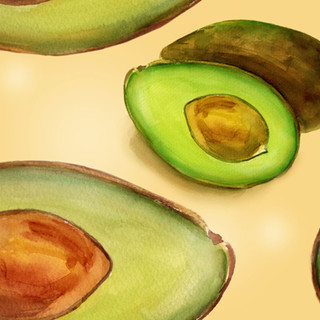The Big Fat Series Part I - Fat Is Our Friend
- Vicky Sham

- May 22, 2019
- 5 min read
Updated: Mar 2, 2020
Fat is Our Friend
Don't be afraid of fat. Fats are essential. We need fats to absorb vitamins and minerals, to insulate our bodies and to protect our organs. High quality fats can help support our metabolism, maintain our bone health and regulate our hormone levels. Fats help to nourish our skin, make our hair glow and keep our nails strong.

Saturated Fat and Heart Disease
You may still think "aren't saturated fats bad for us?" For years, we have been taught to believe that saturated fats were unhealthy and we should eat as little fat as possible. The real message is complicated, not all fats are bad. For years we have been educated to reduce fat intake and replace it with low-fat alternatives filled with sugar and refined carbohydrates. The "fat free" movement turns out to be a public disaster.
A meta analysis of cohort studies has revealed that there is no clinical evidence to support the relationship between dietary saturated fats and the risk of coronary heart disease. In other words, limiting saturated fat consumption does not reduce the risk of heart disease.
However, don't start loading up on burgers yet. Not all fats are the same. The saturated fats in a grain-fed beef burger are very different from those in a grass-fed beef steak or a coconut curry. Likewise, the polyunsaturated fats in deep fried foods from a fast food joint are a world apart from a homemade grilled salmon steak. Please read on, I will explain later.
Follow Our Ancestors
We, human beings, including modern day vegetarians and vegans, are carnivorous by nature. Consuming fat is just part of the human physiology. For thousands of years, humans have been eating entire animals from nose to tail, savouring everything from fatty organs down to the most nutritious bone marrow, as well as fish, fruits, nuts and seeds from plants.
Our ancestors have been eating this natural way for centuries, and they did not suffer from obesity, diabetes or heart disease at the rate that we do now. By the same token, we should know that our digestive system is well adapted to deal with fat consumption. It should make sense to follow traditional wisdom and enjoy fats like the generations before us.
Why Do We Need High Quality Fats
We no longer hunt animals in the wild and most of us don't even raise animals in a farm for food, but it doesn't change the fact that our bodies need dietary fats of the highest quality. The fats we eat have strong implications on our health because fats are a major component of all the cells in our body. Do you know that our brain is about 60% fat? Dietary fats have a direct impact on numerous processes, our brain and visual development, metabolism, inflammatory responses and many others.
What Types of Fats Should We Eat Following our ancestors, our diet should include a variety of fatty acids, including saturated (animal fats like butter, lard, tallow), monounsaturated (olive oil, avocado, nuts, nut butters) and polyunsaturated fats (fish oils, nuts and seeds). Most foods contain a mix of saturated, monounsaturated and unsaturated fats. There is no need (and it is impossible anyway) to measure the intake of each type precisely. The key is to consume a range of healthy fats in real food forms ad libitum, and stay away from deep fried foods from fast food restaurants and processed foods made with trans fats (see my next blog post).
Natural Sources of Dietary Fats
Avocado, olives, coconuts
Whole nuts and seeds such as walnuts, chia and flax
Sustainably caught oily fish such as salmon, mackerel, tuna, anchovies, herring
Pasture-raised, free-range, organic chicken eggs
Organic, cold pressed, extra virgin and unrefined olive oil, coconut oil, avocado oil
Organic grass-fed meats and dairy (whole-fat)
Organic grass-fed ghee/ clarified butter, tallow, lard, duck fat
So, how do you feel about the above? Do you feel grossed out? Or do you realise these are just foods that humans have been eating for hundreds of years, if not thousands of years? Do you see how most of these are real single-ingredient foods. Notice how these fats are also packaged together with a bunch of vitamins and nutrients in fruits, nuts, shells, fish, animal meat and dairy.
Fat Helps You Absorb Fat-Soluble Nutrients
Animal fats such as lard, tallow and ghee are rich in fat soluble vitamins A, D and K2, which are vital for the health of our eyes, bone, skin, heart, reproductive system, hormonal system and immune system. Eggs are rich in vitamins A, D, E and K2. Animals offer plenty of minerals and nutrients in bioavailable form for human bodies to absorb. Our body actually needs fat in order to absorb some of these vitamins. So butter up or even ghee up your carrots to boost your vitamin A absorption.
Grass-Fed Meats, Wild Caught Fish and Full Fat Dairy
Always choose grass-fed animal fats whenever possible, because grass fed animals have much better fatty acid-profile and higher nutrient density than grain-fed animals. The same applies to wild caught fish (feed on plankton, insects, small fish) vs farmed fish (feed on 'organic' food pellets). If you drink milk, go for full fat because you need fat to absorb vitamin D and you need vitamin D to absorb calcium. But note calcium is NOT fat soluble, so taking in fat and calcium in the absence of vitamin D won't help.
Part I - Conclusion
Don't shun healthy fats. Choose your dietary fat carefully. Make a clear distinction between fat from processed foods on the supermarket shelves and single ingredient foods in a farmers market. The type of fat you eat is more important than the amount of fat intake. Eat a wide variety of colourful whole foods that are in season, ideally organically grown vegetables and naturally raised (grass-fed, pasture raised, wild caught) animals free from added hormones and antibiotics.
Simpler still. Eat. Real. Food.
Next Up
Dietary fats are such a huge topic that I feel it deserves a few more blog posts. The next blog posts will cover the horrors of partially hydrogenated vegetable oils or trans fats, which oils are suitable for cooking, followed by the wonders of omega 3 fatty-acids anti-inflammatory diet.
Further information
1. Intake of saturated and trans unsaturated fatty acids and risk of all cause mortality, cardiovascular disease, and type 2 diabetes: systematic review and meta-analysis of observational studies,
de Souza RJ, Mente, Maroleanu, Cozma Al, Ha V, Kishibe T, Uleryk E, Budylowski P, Schuenemann H, Beyene J, Anand SS.
2. Dietary fat and cardiometabolic health: evidence, controversies and consensus for guidance
3. Meta-Analysis of Prospective Cohort Studies Evaluating the Association of Saturated Fat with Cardiovascular Disease," American Journal of Clinical Nutrition 91, no.3 (March 2010); 535-46, P. W. Siri-Tarino, Q. Sun, F. B. Hu, and F. M. Krauss, "
4. Systematic Review of Randomized Controlled Trials of Low-Carbohydrate vs. Low-Fat/ Low Calorie Diets in the Management Obesity and its Comorbidities,", Obesity Reviews 10, no. 1 (January 2009): 36-50, M. Hession, C. Rolland, Uk. Kulkami, et al., "
5. The importance of omega 6/ omega 3 fatty acid ratio in cardiovascular disease and other chronic diseases. Exp Biol: Med 233(6), 675-688, Simopoulos A.O. (2008).
6. Is Butter Really Back? Clarifying the Facts on Fat
7. Reduction in saturated fat intake for cardiovascular disease.,
Hopper L, Martin N, Abedlhamid A, Davey Smith G.
8. Undoctored, Dr. William Davids, MD
9. Eat The Yolks, Liz Wolfe, NTP
10. Why We Get Fat And What To Do About It, Gary Taubes





















Comments